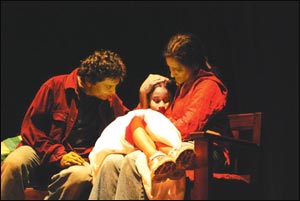View life with love
Sachitra MAHENDRA and Ruwini JAYAWARDANA
Janaka Kumbukage's maiden stage play Sulanga Mata Kata Karai brings
us back to Bob Dylan's celebrated lines: 'the answer, my friend, is
blowin' in the wind'. Sulanga Mata Katha Karai is very lyrical since in
English it is 'wind beckons to me' in English.
|

A scene from Sulanga Mata Katha Karai |
Whether this lyrical sense is touched properly or not is the question
we naturally have watching the play. The plot does not sound lyrical on
the surface as its title suggests. When Moksha starts her day with a
song, her husband Roshan enters the scene and matches her light mood
with strums of his guitar. Moksha loves the lighter side of the life,
whereas her husband is more interested in the harsh realities of life.
The play is all about the couple getting caught up in the
contradictions of taste and character. They simply try to do their best
to overcome these contradictions, though it is not that easy. However
the young couple is very much in love with each other despite being
poles apart personality wise.
It is the outside wind that makes changes in their life, both drastic
and simple at times. The breeze always brings the bad tidings of war and
chaos.
The conflict between this couple is an offshoot of the warring
society. It moulds the household with a man philosophising the harsh
realities, while his wife badly needing her husband's company to enjoy
the light face of the life.
It is the very same wind that brings a fresh wave to their life, when
they get a child deserted by the outside chaos. It props up the ideals
of the child's foster parents: Moksha happy to mother the child and
Roshan happy having helped out a needy in a desperate situation.
At one instance during a especially bad patch Roshan requests Moksha
to let a gust of fresh air into the house. Moksha refuses adding that
the living beings do not live in the house. However the row comes to a
pause amidst the dangers of the outside world. The sounds in the
backdrop signal the danger approaching and unveils the true feelings of
both characters towards one another. This signifies that though disputes
may erupt, it is human nature for loved ones to stick together when
danger is at hand.
Apparently theatre has doors wide open for the artistes to show their
talents to the bone, compared with its newest counterpart, the small
screen. Janaka Kumbukage and Chandani Seneviratne, so to say, are
popular in both these media, probably best known on the small screen.
The couch potatoes do not have the privilege of watching the more
complex intimate gestures in connection to the reality as well as
fantasy. Janaka and Chandani have their usual complexity of performance
on the play, but it looks a little stagnating when they could well do
better as theatre artistes. We wonder if the soaps have blocked their
far reaching talents.
The large digital projection on the stage would have been better, if
not used. We have doubts if the theatre fans are really in to watch a
digital projector turned on.
"Theatre is so endlessly fascinating," said legendary American
playwright Arthur Miller, "because it's so accidental. It's so much like
life." The digital screen, however posh it may be, cannot bring this
live performance out as successful as the theatre. What the digital
screen gives out is artificially perfect performance, quite on contrary
with the theatre on which the artistes cannot fool the audience.
Only instance the digital projector served positive was when it
showed Roshan acting outside in bombed environs. This is so effective,
though it should have been used with the live human performance too.
Nevertheless Kumbukage deserves appreciation for introducing the
digital projector, which is a novel concept.
Sulanga Mata Katha Karai is not a masterpiece, but it is a beautiful
work of art on love and war. Kumbukage urges you to look at life with
new eyes. That wind beckons you to muse over your life in a fresh wave. |



